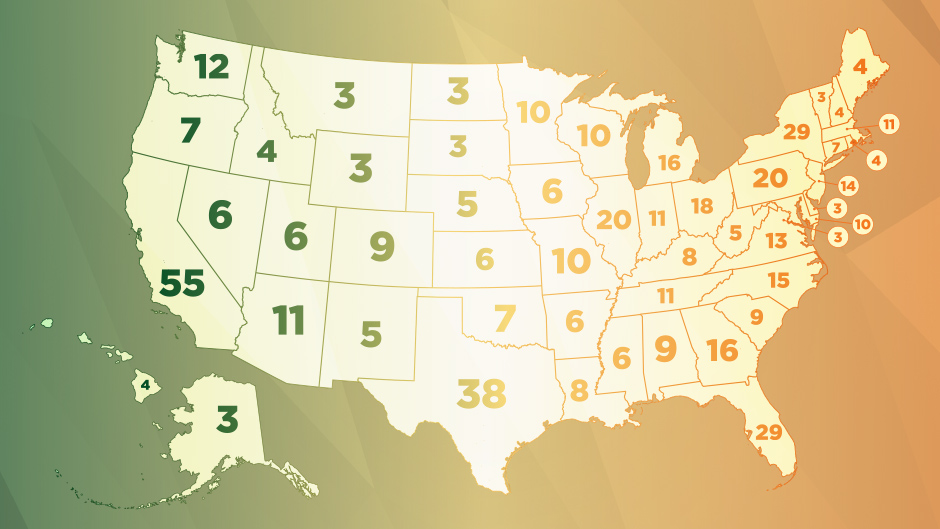Most people hear about the Electoral College during presidential election years—but what exactly is the Electoral College? News@TheU spoke with University of Miami Political Science professor Gregory Koger, to help understand what purpose the Electoral College serves, and why many want it to be abolished.
What is the Electoral College?
The Electoral College is not an actual organization. It doesn’t meet. It’s a process by which presidential electors from each state are selected by the states and cast votes for people who they want to be president and vice president. They never meet because those votes are actually cast in the capital of each of the 50 states, so they never come together in one place. Each state gets a number of electors equal to the number of U.S. Senators (always two) plus the number of its U.S. House representatives. According to the constitution, each state gets to decide what process they use to grant their electoral number to the state. The process that Florida uses is that the winner of the popular vote in the state gets all the Electoral College votes of that state. That is known as the “unit rule.” Every state uses this system except Maine and Nebraska.
Why was the Electoral College implemented in the beginning?
It was an early compromise established by our founding fathers at the Constitutional Convention. For most of the convention, our founding fathers argued if a national legislator should choose the president. They didn’t like that fact that it would make the president dependent on Congress, so they started looking for other options. One delegate from Pennsylvania proposed a national popular vote for president, and everyone disliked the idea.
Why do you think there’s a growing amount of people in favor of the removal of the Electoral College?
There’s a partisan element to it. In recent years Democrats have been much more likely to win the popular vote and lose the Electoral College. It happened in 2000 and it happened in 2016. That’s frustrating to Democrats who feel like there’s no reason they should be in this situation of actually winning the national popular vote and watching someone else get inaugurated as president. It’s growing now because there’s two recent incidents.
What would you say are the pros and cons of the Electoral College?
Pros:
- The Electoral College makes it easier to determine who won the election. If there are controversies about the voting, at least those controversies are focused on a few states, as opposed to having to do a national recount.
- One thing that people have argued is that it enhances legitimacy of the winner. What that means is, you can get a very narrow percentage of the popular vote and still will a majority of the Electoral College. Winning with a huge majority of the Electoral College helps people to accept that the outcome wasn’t as close as it looks if you just look at just the popular vote. It makes it more willing to accept that the winner was legitimate.
Cons:
- Critics say it over represents rural states. For example, voters in Alaska, Wyoming, Delaware and Vermont have more influence on the outcome of the election than larger states.
- It focuses a candidate’s attention on swing states. That’s good for Florida because Florida has traditionally been a swing state. What it means is that large segments of the population like people in California, Texas, New York and Illinois have been ignored. If candidates know how a state is going to vote, then there’s no incentive for them to campaign there and to talk to people to find out what their problems are.
What would it take to change the Electoral College system?
The most straight forward way to do that is to create a Constitutional amendment that would implement a direct popular vote. It’s unlikely that’s going to happen because it’s extremely hard to pass an amendment. That’s where the “National Popular Vote Interstate Compact” comes in. The idea is that every state part of the compact would give all of their electoral votes to the winner of the national popular vote, rather than the individual who brings in the most votes in their state. That may mean that a large state like California, with 54 Electoral College votes, could end up giving all of its votes to a Republican candidate who won the national popular vote even if a Democrat won specifically in their state. All it takes for a state to join this system is to pass a state law. It could go into effect once enough states have joined to comprise a majority of the Electoral College. Up to this point, it’s been primarily Democratic states that have come on board. What would really help is if strongly Republican states like Alabama and Mississippi joined in and agreed that they’re not getting much attention either.

